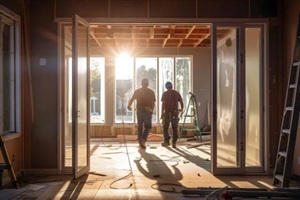
In residential construction, subcontractors work to bring projects to fruition. However, if subcontractors lack appropriate insurance coverage, home builders may find themselves exposed to significant financial and legal risks. Making sure that every subcontractor on a project carries the necessary insurance is imperative for safeguarding the project, your business, and for maintaining compliance with regulatory standards.
Why Subcontractor Insurance Matters
When a subcontractor lacks adequate insurance, any accidents, property damages, or injuries that occur on the job site can become the responsibility of the home builder. This leads to potential financial burdens, project delays, and reputational harm.
For instance, a tragic incident in Meriden, Connecticut, highlighted the consequences of inadequate subcontractor insurance. A worker employed by a subcontractor without proper workers’ compensation coverage suffered a fatal accident. Subsequent investigations revealed multiple violations, including the misclassification of workers and a lack of appropriate insurance, resulting in substantial fines and work stoppages.
Essential Insurance Coverages for Subcontractors
To mitigate risks, home builders should verify that subcontractors possess the following insurance coverages:
Workers’ Compensation Insurance
This coverage is required in most states and provides benefits to employees who suffer work-related injuries or illnesses. Verifying that subcontractors have valid workers’ compensation insurance protects both the workers and the home builder from potential liabilities.
Commercial General Liability (CGL) Insurance
CGL insurance covers third-party claims of bodily injury or property damage arising from the subcontractor’s operations. It’s a foundational policy that helps shield home builders from lawsuits and claims resulting from subcontractor activities.
Commercial Auto Insurance
Commercial auto insurance is necessary if subcontractors use vehicles for work purposes. It covers damages resulting from vehicle-related incidents, preventing any accidents involving subcontractor vehicles from impacting the home builder’s insurance.
Professional Liability Insurance
Also called errors and omissions insurance, this coverage protects against claims of inadequate work or professional negligence. It is particularly relevant for subcontractors providing design or consulting services.
Umbrella Insurance
An umbrella policy provides additional liability coverage beyond the limits of primary policies. For large projects or those with heightened risks, requiring subcontractors to have umbrella insurance can offer an extra layer of protection.
Steps for Home Builders to Verify Subcontractor Insurance

Home builders must be diligent in confirming subcontractors are properly insured which can be accomplished by simply asking the right questions. Here are some important steps for verifying subcontractor insurance policies:
1. Request Certificates of Insurance (COIs)
Always obtain a COI from each subcontractor before work begins. This document provides evidence of the subcontractor’s insurance coverages and policy limits.
2. Verify Policy Details
Don’t just accept the COI at face value. Contact the insurance provider listed to confirm that the policy is active, the coverage limits are adequate, and there are no exclusions that could pose risks.
3. Include Insurance Requirements in Contracts
Clearly outline the required insurance coverages and limits in subcontractor agreements to make sure everyone is on the same page. Specify that the subcontractor must maintain these coverages throughout the project’s duration and provide updated COIs upon renewal.
4. Monitor Compliance
Implement a system to track insurance expiration dates and confirm that subcontractors renew their policies on time. Regular audits can help maintain compliance and reduce potential liabilities.
Regulatory Considerations
In Virginia, contractors and subcontractors are subject to clear insurance requirements under state law. The Virginia Workers’ Compensation Act mandates that any business with three or more employees, including subcontractors, must carry workers’ compensation insurance. This applies whether those individuals are part-time, full-time, seasonal, or even family members.
Importantly, if a subcontractor does not carry this required coverage, liability can still fall back on the general contractor or home builder who hired them. That means a home builder could be held responsible for injuries sustained by a subcontractor’s employee if the subcontractor failed to comply with the law.

Virginia also allows home builders to request Form 61A, a certificate of insurance compliance, from the subcontractor’s insurer. This document confirms that the subcontractor has valid workers’ compensation coverage in place.
For liability and general contractor licensing, the Virginia Department of Professional and Occupational Regulation (DPOR) requires contractors to carry minimum levels of general liability insurance and submit proof when applying for or renewing a license.
Ensuring that subcontractors meet these legal requirements helps reduce liability exposure and keeps projects in compliance with state regulations.
Protect Your Home Building Business with Reliable Subcontractor Insurance Support
Verifying that your subcontractors carry the proper insurance coverage is a smart way to protect your home-building business from costly claims and project disruptions. At Burton & Company, we help Virginia home builders assess risk, confirm coverage, and implement the right insurance solutions so you can build with confidence.
Contact Burton & Company today to discuss how we can support your business with dependable insurance guidance and coverage that works for every part of your team.

